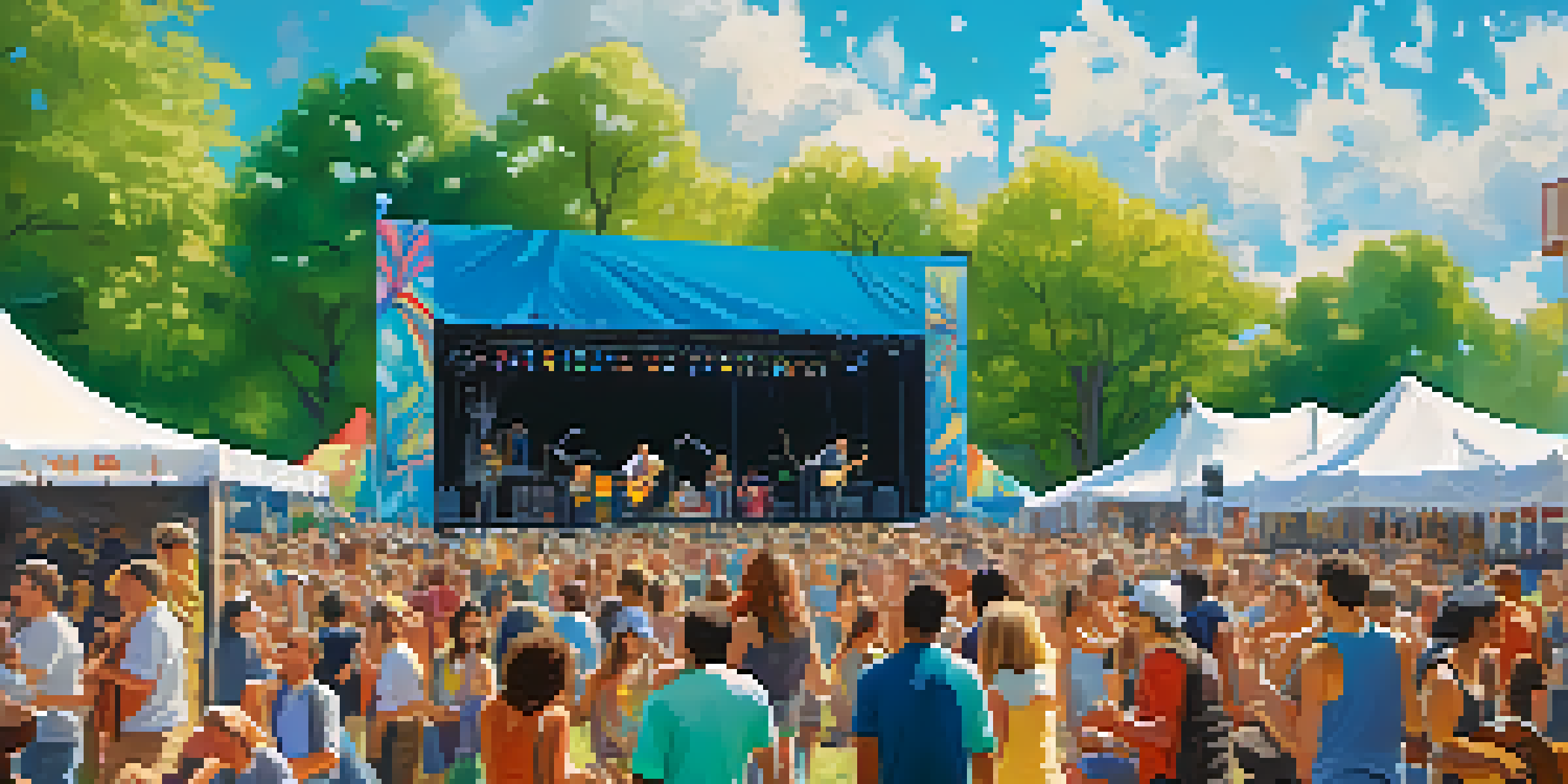The Impact of Local Music Festivals on Community Identity

Understanding Community Identity Through Music Festivals
Community identity is often shaped by shared experiences and cultural expressions, and music festivals play a pivotal role in this process. They bring together diverse groups of people, allowing them to celebrate their unique heritage and values. Through the lens of music, attendees can explore and appreciate their community’s history, fostering a sense of belonging that resonates long after the last note has played.
Music can change the world because it can change people.
When locals gather to enjoy regional artists, it helps reinforce pride in their culture and traditions. For example, a small town hosting a folk music festival may highlight its agricultural roots, inviting musicians who tell stories of the land. This not only entertains but also educates attendees about their shared background, making the cultural connection even stronger.
Moreover, music festivals often serve as a platform for local talent, showcasing artists who represent the community’s voice. By celebrating homegrown talent, these events encourage residents to take pride in their cultural contributions, strengthening the community’s collective identity.
Economic Benefits: Strengthening Community Ties
Local music festivals can significantly boost the economy of a community, creating a ripple effect that enhances social ties. Vendors, artists, and local businesses benefit from increased foot traffic and sales during these events. This economic uplift not only helps sustain local businesses but also fosters camaraderie among residents who come together to support their community.

For instance, a town that hosts an annual music festival may see an influx of visitors, leading to full hotels and bustling restaurants. This surge in activity can encourage collaboration among businesses, as many may team up to create festival packages or special offers. This collaboration can strengthen relationships within the community, as stakeholders work towards a common goal.
Music Festivals Build Community Identity
Local music festivals foster a sense of belonging and pride by celebrating diverse cultural expressions and shared experiences.
Additionally, festivals can create job opportunities for local residents, further intertwining the community’s economic and social fabric. From event planning to security roles, local residents often find work that connects them to the festival, deepening their investment in its success and the community as a whole.
Cultural Exchange: Bridging Gaps Through Music
Music festivals are not just about local talent; they often invite artists from diverse backgrounds, fostering cultural exchange. This exposure enables community members to engage with different musical styles and traditions, enriching their own cultural tapestry. As attendees dance to rhythms they may not be familiar with, they gain a deeper appreciation for the variety of cultures represented.
Without music, life would be a mistake.
For example, a multicultural festival may feature everything from jazz to reggae, inviting attendees to experience new sounds and practices. This not only entertains but also educates, prompting conversations about the significance of these genres and the histories behind them. Such interactions pave the way for understanding and respect among different cultural groups within the community.
Moreover, this cultural exchange can lead to collaborations between local artists and those from outside the community. By blending influences, musicians can create unique new sounds that reflect their diverse backgrounds, further enriching the local music scene and enhancing community identity.
Social Cohesion: Building Bonds Among Residents
One of the most profound impacts of local music festivals is their ability to foster social cohesion. When people gather for a common purpose, it helps break down barriers and encourages interaction among residents who may not otherwise connect. This shared experience can lead to new friendships and strengthen existing ones, making the community feel more united.
Imagine neighbors who have lived next to each other for years but have never spoken, suddenly bonding over a favorite band at a festival. Such moments create lasting memories and encourage a sense of camaraderie that extends beyond the event. As attendees share experiences, they become more invested in each other and their community.
Economic Growth from Local Events
Music festivals boost local economies by increasing foot traffic, supporting businesses, and creating job opportunities.
Furthermore, these gatherings often include activities that promote inclusivity, such as workshops or community art projects. By involving residents in various aspects of the festival, organizers can help cultivate a sense of ownership and pride, reinforcing the idea that everyone has a stake in the community’s identity.
Youth Engagement: Inspiring the Next Generation
Local music festivals provide a fantastic opportunity to engage and inspire younger generations. By exposing youth to various musical styles and cultural expressions, these events can ignite a passion for music and the arts. This excitement can lead to increased participation in local music programs, fostering a new wave of talent that contributes to community identity.
For example, a festival that includes workshops for young musicians allows them to learn from seasoned artists and gain valuable skills. This hands-on experience not only boosts their confidence but also connects them to the local music scene, encouraging them to contribute their unique voices. As they grow, these young artists can help shape the future of the community’s cultural landscape.
Additionally, involving youth in festival planning and execution can instill a sense of responsibility and pride in their community. By giving them a role in organizing events, they learn the importance of collaboration and community service, ensuring that the spirit of the festival lives on in future generations.
Strengthening Local Identity Through Tradition
Many local music festivals celebrate traditional music and customs that define a community’s identity. By honoring these traditions, festivals serve as a reminder of what makes each community unique. This connection to heritage not only boosts local pride but also educates attendees about the importance of preserving these customs for future generations.
For instance, a festival that highlights indigenous music may include storytelling sessions that educate attendees about cultural practices and values. This immersion in tradition fosters a deeper understanding and respect for the community’s history. As residents engage with their heritage, they are more likely to advocate for its preservation.
Cultural Exchange Enriches Communities
By inviting diverse artists, music festivals promote cultural exchange, enhancing community identity and fostering mutual respect.
Moreover, by incorporating traditional elements into modern festivals, communities can create a blend of old and new that appeals to a wider audience. This fusion can attract younger generations while still honoring the past, ensuring that local identity remains vibrant and relevant.
The Lasting Legacy of Music Festivals on Communities
The impact of local music festivals often extends beyond the event itself, leaving a lasting legacy on community identity. As participants reflect on their experiences, the memories created can influence how residents perceive their community and its culture. This positive reinforcement can lead to increased civic engagement and a desire to contribute further to community initiatives.
For example, communities that host successful music festivals often see a rise in local pride, prompting residents to support other cultural events and initiatives. This ripple effect can create a vibrant atmosphere where community members actively seek to enhance their surroundings. Over time, this increased involvement can lead to a stronger, more resilient community.

Ultimately, local music festivals serve as a powerful reminder of the importance of coming together to celebrate shared values and experiences. They create an environment where community identity thrives, ensuring that the legacy of music and culture continues to resonate for generations.